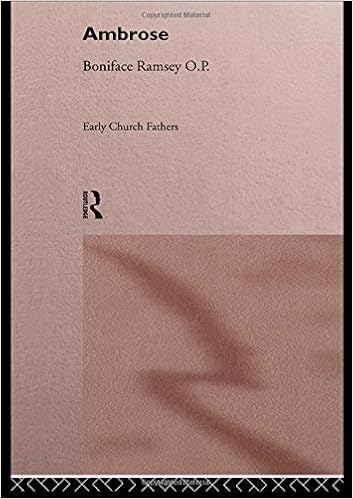 Today is the feast of St. Ambrose. I have a 1st class relic in the Two Trinities Chapel, so he is, in a sense, a homie.
Today is the feast of St. Ambrose. I have a 1st class relic in the Two Trinities Chapel, so he is, in a sense, a homie.
St. Ambrose of Milan (+4 April 397), was a titanic figure of the late 4th century who changed the shape of Church and State relations for a thousand years. He brought much of the wisdom of Greek writings to the West. He helped God bring St. Augustine of Hippo into the fold.
There are many things to write about Ambrose. Here are a few.
There is a famous moment recounted by St. Augustine in his Confessions (6.3) about visiting St. Ambrose. Firstly, you should know that, in the ancient world, when people read, they read aloud, or at least moved their lips. It helped the memory in a time when written works were precious. One day Augustine walked into the room where Ambrose was sitting and saw him staring at a book! Ambrose was reading and not even moving his lips! Augustine was so impressed by this that slipped silently out of the room without saying anything to Ambrose, lest he disturb him.
St. Jerome pretty much hated Ambrose. I have a theory about that. Anyway… of Ambrose, Jerome wrote that he was like a raven croaking ill omens and a jackdaw who dressed himself in the feathers of other birds (i.e., he was a plagiarist… ). Of his swift rise from being unbaptized to be the mighty bishop of the imperial city Milan within one week, he savagely wrote of Ambrose
Heri catechumenus, hodie pontifex; heri in amphitheatro, hodie in ecclesia; uespere in circo, mane in altari; dudum fautor strionum, nunc uirginum consecrator: num ignorabat apostolus tergiuersationes nostras et argumentorum ineptias nesciebat?
One who was yesterday a catechumen is today a bishop; one who was yesterday in the amphitheater is today in the church; one who spent the evening in the circus stands in the morning at the altar: one who a little while ago was a patron of actors is now a dedicator of virgins. Was the apostle ignorant of our shifts and subterfuges? Did he know nothing of our foolish arguments?
Ambrose complained to his sister St. Marcellina about being in pain from his right shoulder. In 2018 there was a forensic examination of the remains of Ambrose. They found that his right clavicle had been broken (an injury in his youth) and it hadn’t healed properly. This also explains his asymmetrical posture in a mosaic of him – probably while still alive – in the chapel of S Vittore in Ciel d’Oro in the Basilica of St Ambrose in Milan.
Legend has it of baby Ambrose that once when he was sleeping, bees swarmed in and out of his mouth, foretelling that his preaching would be as sweet as honey. St. Bernard is the called Doctor Mellifluous, however. On the theme of bees, the Exsultet has bee imagery and the text is sometimes attributed to Ambrose.
Want to read more about him? The best you can find is Ambrose by Boniface Ramsey. US HERE – UK HERE

I also have several old PODACAzTs in which I speak of Ambrose. HERE
There’s not a single bishop alive today who can vaguely approach Ambrose for either brains or b****. Shall we see his like again?




























“in the ancient world, when people read, they read aloud, or at least moved their lips. It helped the memory in a time when written works were precious.”
I was always lead to believe that the primary reason was the lack of letter cases, punctuation, or spaces between letters… often making the whole thing difficult without “sounding it out.”
5th Century manuscript of Virgil:
https://upload.wikimedia.org/wikipedia/commons/thumb/1/15/RomanVirgilFolio014rVergilPortrait.jpg/639px-RomanVirgilFolio014rVergilPortrait.jpg
What an orthographic nightmare. Spaces between words, like upper and lower cases, are a Christian invention. (Perhaps the contemporary critics of the Church should go back to writing in unspaced capitals.) Those who could read silently were considered to be quite intelligent… I believe that the same powers of mind were ascribed to Julius Caesar.
The history of the Church and her Saints is so edifying.
i can attest to how painful an improperly healed clavicular fracture is. reinjured mine two years ago and rare is the night it doesn’t wake me up a few times.
i’m fond of the story – though it seems improbable – that Ss. Ambrose and Augustine composed the Te Deum Laudamus in a spontaneous and antiphonal fashion.
Only if God raises them up. We have some with one of the two qualities but in insufficient amount. I can’t think of any bishop who has both in a sufficient quantity, and they are both necessary. Well, maybe I can identify one.
“Mellifluous” – Such a great word! Delightful to read, say, hear….it just kind of bounces…